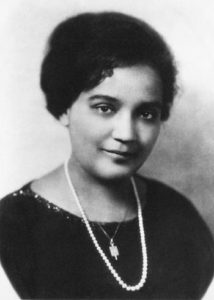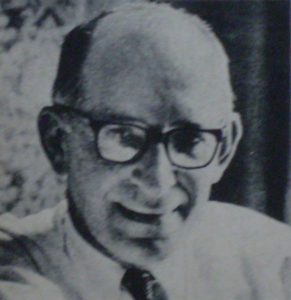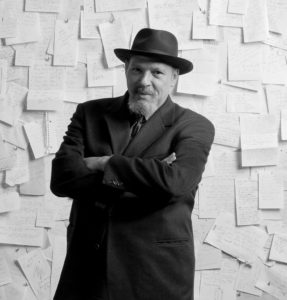This Week in History, April 26th – May 2nd.

Jesse Redmon Fauset 1
“The remarkable thing about this gift of ours is that it has its rise, I am convinced, in the very woes which beset us . . . It is our emotional salvation.”
— Jesse Radmon Fauset2
Jessie Redmon Fauset was born this week in 1882, the seventh child of an African American Methodist Episcopal Minister and his wife Annie, who died while Ms. Fauset was still a young girl. Her father subsequently married Bella, a white, Jewish women who had converted to Christianity. Bella had three children from her first marriage, and together, she and Reverend Fauset had three more of their own.3
Fauset’s family was large and blended. Their financial resources were meager, but her parents emphasized education for their children and Ms. Fauset graduated as valedictorian from Philadelphia’s top academic school.4
She wanted to attend Bryn Mawr College, but was not allowed to do so on account of her race. Instead, she received a scholarship to Cornell University, from which she graduated in 1905 with a degree in Classical languages. She was a member of the Phi Beta Kappa Society and later received her Masters in French from the University of Pennsylvania. She taught High School French and Latin during the academic school year and studied at the Sorbonne in Paris in the summers.3
Ms. Fauset went on to become an author of poetry and novels, an editor of the NAACP magazine, The Crisis and a nurturer of the literary talent that blossomed into the Harlem Renaissance.5
She was at the intersection of being both Black and a woman in early twentieth century America.
One author described her situation this way: “There is no telling what she would have done had she been a man, given her first-rate mind and formidable efficiency at any task.”6
You can read Ms. Fauset’s final novel, Comedy, American Style, by checking it out online through the Clark College Libraries. It is a tragedy, an exploration of Colorism7 and its toxic, destructive effect on an African-American family.
“You see in others who you are.”8
“The great thing about writing: Stay with it… ultimately you teach yourself something very important about yourself.”8
— Bernard Malamud

Author and teacher Bernard Malamud was born this week in 1914. His parents were Russian Jews who immigrated to Brooklyn, New York.
Malumud’s novel, The Fixer, won the both the National Book Award10 and the Pulitzer Prize11. It is the fictionalization of an historic case of anti-semitism, the false imprisonment and trial of Menahem Mendel Beilis12 for the ritual murder of a child in Tsarist Russia. While the novel is based on a historical event the characters are entirely Malamud’s creation.
“First drafts are for learning what your novel or story is about. Revision is working with that knowledge to enlarge & enhance an idea, to reform it . . . Revision is one of the true pleasures of writing.”13
Malamud wrote slowly, revising his works as he wrote. He finished eight novels and a number of short stories in his career, including The Natural,14 and The Assistant15.
He taught freshman composition at Oregon State University and creative writing at Bennington College until his retirement. In 1967 he was made a member of the American Academy of Arts and Sciences16
“I don’t think you can do anything for anyone without giving up something of your own.”17
To find about about the author’s life, check out Bernard Malamud,A Writer’s Life18 online through the Clark College Libraries
“And I acted when the actors didn’t show up. As the director, I knew all the lines and I took over more times than I wanted to. I didn’t know much about directing, but I was the only one willing to do it. Someone had looked around and said, “Who’s going to be the director?” I said, “I will.” I said that because I knew my way around the library….” — 19August Wilson19
Playwright August Wilson was born this week in 1945.

Frederick August Kittel was born in Pittsburgh, Pennsylvania, to a German immigrant father and an American mother. His father was a baker who was rarely at home and his mother cleaned houses. He was the fourth of six children. When his father passed away, Frederick August changed his surname to Wilson, in honor of his mother, Daisy Wilson.21
Wilson and his siblings had a tough life, growing up bi-racial in an economically depressed neighborhood named The Hill. The Hill would later be the setting for Wilson’s Pittsburg Cycle of plays.22
School was an ordeal for Wilson. He was the only black student in his class and he was greeted each day with a note on his desk telling him to “go home n——–r”.21 In the 10th grade he was accused of plagiarizing a 20 page paper he written for a history class by his teacher. He dropped out of school and began educating himself at the Carnegie Library of Pittsburgh.23
Wilson would win the Pulitzer Prize for two of his works, Fences, 24 and The Piano Lesson25 both part of his Pittsburg Cycle of plays. As a part of his legacy a theater on Broadway was renamed in his honor.26
Learn more about this prolific playwright by checking out the ebook, August Wilson from the Clark College Libraries.
1 https://commons.wikimedia.org/wiki/File:Jessie-redmon-fauset-214×300.jpg
2 https://www.literaryladiesguide.com/author-quotes/quotes-jessie-redmon-fauset/
3 https://en.wikipedia.org/wiki/Jessie_Redmon_Fauset#cite_ref-Bigelow_4-1
4 https://en.wikipedia.org/wiki/Jessie_Redmon_Fauset#cite_ref-encyc_7-0
5 https://www.literaryladiesguide.com/author-biography/jessie-redmon-fauset/
6 https://www.newyorker.com/books/page-turner/the-forgotten-work-of-jessie-redmon-fauset
7 https://www.nccj.org/colorism-0
8 https://www.azquotes.com/author/9316-Bernard_Malamud
9 https://commons.wikimedia.org/wiki/File:Bernard_Malamud.jpg
10 https://en.wikipedia.org/wiki/Bernard_Malamud#cite_ref-nba1967_1-0
11 https://en.wikipedia.org/wiki/Bernard_Malamud#cite_ref-pulitzer_2-0
12 https://en.wikipedia.org/wiki/Menahem_Mendel_Beilis
13 https://www.goodreads.com/author/quotes/447.Bernard_Malamud
14 https://www.goodreads.com/book/show/685.The_Natural
15 https://www.goodreads.com/book/show/3068.The_Assistant
16 https://en.wikipedia.org/wiki/American_Academy_of_Arts_and_Sciences
17 https://www.azquotes.com/author/9316-Bernard_Malamud
18 https://alliance-primo.hosted.exlibrisgroup.com/permalink/f/1coh3lh/TN_pq_ebook_centralEBC415118
19 https://www.theparisreview.org/interviews/839/the-art-of-theater-no-14-august-wilson
20 https://www.flickr.com/photos/huntingtontheatreco/6544711905
21 https://www.nytimes.com/2005/10/03/theater/newsandfeatures/august-wilson-theaters-poet-of-black-america-is.html
22 https://www.marintheatre.org/productions/fences/fences-august-wilsons-century-cycle
23 https://www.wqed.org/augustwilson/timeline
24 https://lonetreeartscenterblog.net/2018/04/19/review-august-wilsons-fences/
25 https://www.nytimes.com/2012/11/19/theater/reviews/august-wilsons-piano-lesson-at-signature-theater.html
26 https://www.ibdb.com/theatre/august-wilson-theatre-1179
27 https://alliance-primo.hosted.exlibrisgroup.com/permalink/f/q6vgkg/CP71144463180001451



